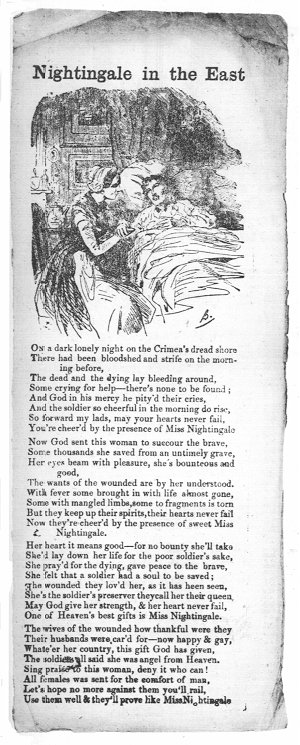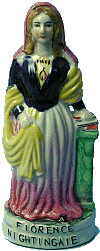|
This is one of the many broadsides that circulated after FN achieved fame in the Crimean. A broadside was a song or poem printed on a sheet of paper and sold on the street for a very small sum, often about current events.


A seven-inch ceramic statuette of Nightingale. Her hand rests on a column bearing a stack of books, to show her scholarly nature.
|
 |

|
 |
A poem from the famous English satirical magazine Punch published
during the time of the Crimean War, 1854-1856, when Miss Florence
Nightingale and her nurses were nursing English Soldiers for the first
time in English history. Since this poem is 150 years old, the language, the
punctuation, and the spelling may be unfamiliar; you may need to use a dictionary.
The Nightingale's Song to the Sick Soldier
Listen, soldier, to the tale of the tender nightingale,
'Tis a charm that soon will ease your wounds so cruel,
Singing medicine for your pain, in a sympathetic strain,
With a jug, jug, jug of lemonade or gruel.
Singing bandages and lint; salve and cerate without stint,
Singing plenty both of liniment and lotion,
And your mixtures pushed about, and the pills for you served out,
With alacrity and promptitude of motion.
Singing light and gentle hands, and a nurse who understands
How to manage every sort of application,
From a poultice to a leech; whom you haven't got to teach
The way to make a poppy fomentation.
Singing pillow for you, smoothed; smart and ache and anguish smoothed,
By the readiness of feminine invention;
Singing fever's thirst allayed, and the bed you've tumbled made,
With a cheerful and considerate attention.
Singing succour to the brave, and a rescue from the grave,
Hear the nightingale that's come to the Crimea,
'Tis a nightingale as strong in her heart as in her song,
To carry out so gallant an idea.
The famous poem in which Henry Wadsworth Longfellow coins the term "lady with the lamp." Saint Philomena is a patron of the sick.
Santa Filomena
Whene'er a noble deed is wrought,
Whene'er is spoken a noble thought,
Our hearts, in glad surprise,
To higher levels rise.
The tidal wave of deeper souls
Into our inmost being rolls,
And lifts us unawares
Out of all meaner cares.
Honor to those whose words or deeds
Thus help us in our daily needs,
And by their overflow
Raise us from what is low!
Thus thought I, as by night I read
Of the great army of the dead,
The trenches cold and damp,
The starved and frozen camp,--
The wounded from the battle-plain,
In dreary hospitals of pain,
The cheerless corridors,
The cold and stony floors.
Lo! in that house of misery
A lady with a lamp I see
Pass through the glimmering gloom,
And flit from room to room.
And slow, as in a dream of bliss,
The speechless sufferer turns to kiss
Her shadow, as it falls
Upon the darkening walls.
As if a door in heaven should be
Opened and then closed suddenly,
The vision came and went,
The light shone and was spent.
On England's annals, through the long
Hereafter of her speech and song,
That light its rays shall cast
From portals of the past.
A Lady with a Lamp shall stand
In the great history of the land,
A noble type of good,
Heroic womanhood.
Nor even shall be wanting here
The palm, the lily, and the spear,
The symbols that of yore
Saint Filomena bore.
|



